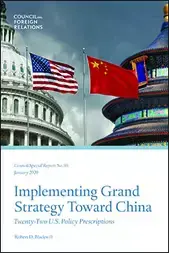- Iran
- Israel-Hamas
-
Topics
FeaturedIntroduction Over the last several decades, governments have collectively pledged to slow global warming. But despite intensified diplomacy, the world is already facing the consequences of climate…
-
Regions
FeaturedIntroduction Throughout its decades of independence, Myanmar has struggled with military rule, civil war, poor governance, and widespread poverty. A military coup in February 2021 dashed hopes for…
Backgrounder by Lindsay Maizland January 31, 2022
-
Explainers
FeaturedDuring the 2020 presidential campaign, Joe Biden promised that his administration would make a “historic effort” to reduce long-running racial inequities in health. Tobacco use—the leading cause of p…
Interactive by Olivia Angelino, Thomas J. Bollyky, Elle Ruggiero and Isabella Turilli February 1, 2023 Global Health Program
-
Research & Analysis
Featured
Terrorism and Counterterrorism
Violence around U.S. elections in 2024 could not only destabilize American democracy but also embolden autocrats across the world. Jacob Ware recommends that political leaders take steps to shore up civic trust and remove the opportunity for violence ahead of the 2024 election season.Contingency Planning Memorandum by Jacob Ware April 17, 2024 Center for Preventive Action
-
Communities
Featured
Webinar with Carolyn Kissane and Irina A. Faskianos April 12, 2023 Academic and Higher Education Webinars
-
Events
FeaturedJohn Kerry discusses his work as U.S. special presidential envoy for climate, the challenges the United States faces, and the Biden administration’s priorities as it continues to address climate chan…
Virtual Event with John F. Kerry and Michael Froman March 1, 2024
- Related Sites
- More
Diplomacy and International Institutions
Grand Strategy
-
Trump’s Foreign Policy Doctrine? The Withdrawal Doctrine.President Trump’s penchant for going it alone makes little sense in a world increasingly defined by global challenges that can best be met through collective action.
-
Reflections on India’s Foreign Affairs StrategyI had the opportunity earlier this week to take part in a fascinating webinar discussion, hosted by Brookings India, on India’s foreign policy strategy. The anchor for the conversation was a new pape…
-
A Cold War With China Would Be a MistakeBeijing poses some real challenges, but the most formidable threats the U.S. now faces are transnational problems like pandemics, climate change, cyberattacks, and terrorism.
-
The Only Sensible Iran Strategy Is ContainmentThe most effective plan against the Islamic Republic has always been the most obvious—and the one nobody in Washington seems willing to try.
-
Can Bernie Sanders’s Foreign Policy Vision Lay Claim to FDR’s Mantle?If he wishes to follow in Franklin Delano Roosevelt's footsteps, U.S. presidential candidate Bernie Sanders will need to clarify America's interests, role, and responsibilities in defending the global balance of power.
-
Implementing Grand Strategy Toward China
![]() The Trump administration recognizes the China challenge, but it needs a grand strategy. Blackwill recommends decisive action, sustained diplomacy, collaboration among branches of the U.S. government, and working with allies in Asia and Europe, among other approaches.
The Trump administration recognizes the China challenge, but it needs a grand strategy. Blackwill recommends decisive action, sustained diplomacy, collaboration among branches of the U.S. government, and working with allies in Asia and Europe, among other approaches.
-
Great Power Competition and Cyber ConflictThis symposium, held January 7, 2020, addressed the potential consequences of great power competition in cyberspace and examined the current state of Russian, Chinese, Iranian, and North Korean cyber operations, as well as how the United States is responding. The keynote session was led by Angus King and Mike Gallagher of the Cyberspace Solarium Commission.
-
Europe Wants Strategic Autonomy, but That Is Much Easier Said Than DoneAchieving strategic autonomy will require Europeans to develop a coherent strategic culture, reach agreement on priorities, and reassure U.S. leaders that greater autonomy is complementary to NATO.
-
Why Would Arab Leaders Pursue Strategic Partnerships With Russia?Amir Asmar is a Department of Defense analyst and CFR’s national intelligence fellow. Throughout his intelligence career, his primary area of focus has been the Middle East. He held a wide range of a…
-
What Would "Restraint" Really Mean for U.S. Foreign Policy?Proponents of restraint need to clarify what the term means, how to implement it, and its implications for U.S. national interests and world order.
-
How Do Warren's and Sanders's Progressive Foreign Policy Visions Stack Up?Elizabeth Warren and Bernie Sanders are both progressives, but their foreign policy visions diverge in important ways.
-
How Do Warren's and Sanders’s Progressive Foreign Policy Visions Stack Up?Elizabeth Warren and Bernie Sanders are both progressives, but their foreign policy visions diverge in important ways.
-
The Case for Restraint: Drawing the Curtain on American EmpireThe United States should resist imperial temptations and instead pursue a foreign policy of restraint.
-
America's Quest for an Open World: A Grand Strategy Grounded in HistoryAmerican grand strategy should draw inspiration from the principles of the post-war order. The United States should work to advance an open world.
-
The White House National Cyber Strategy: Continuity with a Hint of HyperboleThere seems to be a general consensus that the White House's new cyber strategy is a continuation of existing policy. However, the us-versus-them approach the strategy takes could pose a problem.
 Online Store
Online Store
